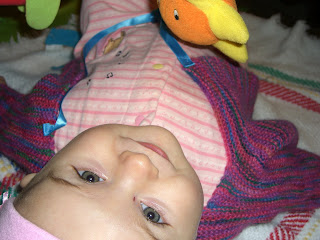
New parents don't always speak very openly to one another. Sure, they'll occasionally admit that they're not sleeping very much, or they'll voice some uncertainty about whether they should be imposing a stricter schedule, or making the change to solid foods. But generally - and I suppose this blog is just another example of the tendency - they speak in rather rosy tones. The baby's always thriving; things are great; life is good.
Which is is, of course. But every now and then a parent
does speak with complete honesty, and it's almost as though a dam has broken. That, at least, is how we felt when a good friend of ours recently expressed some relief that his two small children are now in a day-care program. Really, he noted, they're not very exciting conversational partners. And, he went on, about an hour or an hour a half a day with them is probably enough.
Wow! Was this that rarest of all individuals, one honest enough to call the king naked? Or was he simply (we wondered, like sheep now unsure about why we flock) something less than the ideal parent? Was he saying what we wanted to, but felt we couldn't, or was he saying something that probably shouldn't be said? Or both?
In thinking about this, L. and I didn't really ever answer any of those big questions, but we did try to tackle his implicit question. What is the ideal length of time, per day, with a baby who can't yet talk? Is it, as the saints of motherhood might claim, as much as one can get? Is it whatever the baby seems to need? Or is it, posits Homer S., the time between the football game and the trip to the donut store?
In his A Short Guide to Long Play, Martyn Goff suggests that the perfect length of an overture is between 5 and 10 minutes: such a duration allows a composer to establish a range of ideas without detracting from the body of the piece. Similarly, in his Radio: The Book, Steve Warren argues that the ideal length for a demo, for prospective on-air d.j.s, is between 7 and 10 minutes: enough to give the producers a taste of one's work, but not so much as to seem pretentious. And of course the song most often forwarded as the greatest of all rock tunes, Stairway to Heaven, clocks in at 8 minutes and a second. There's something about an 8-minute span.
Okay - but surely other forms of activity demand other lengths? Well, sure. Take, for instance, an unsigned piece in a 1958 issue of Current Opinion, which wondered what the ideal length of a novel should be, and concluded that many prefer books that take a reader no more than around 4 hours (which meant, in turn, about 35,000 to 40,000 words). Admittedly, the writer added, there are many (including A. Conan Doyle) who say that a successful novel demands a longer form - that a novel, in other words, should last a reader a good 12 or 15 hours, at a minimum. But, he concluded, "under existing conditions, reading, as people are reading, simply for pleasure or recreation, the short novel holds out an undoubted attraction."
I like that phrasing. And I wonder if it could be massaged into a summary of attitudes towards parenting - something like, "under existing conditions, parenting, as people are parenting, for both love and a vast range of other variables, is often attractive if..." If what, though? Well, if they're working Australian dads,
I recently learned, they probably spend around three to four hours with their infant. That's pretty generous:
another study estimated that Aka fathers (who are nomadic pygmies) only hold their infants for around 10 to 20 minutes per day. Maybe they spend the rest of their day reading long novels by Doyle.
In any event, put L. and me down as comfortably Australian. No offense to Cleo, but we both felt that around 3 to 4 hours of one-on-one time with her, per day, might be ideal. Which, when you realize that Cleo still sleeps for roughly 14 hours per day, works pretty well. Add in a little bit of full-family time, and there's a complete 24-hour day, with no hard feelings. But also, we might add, with little time to perfect that d.j. demo we've been working on...
 With a bottle of prosecco in the fridge, and 2010 calendars scattered about the house, and a slate of meaningful AFC games on tap this coming Sunday, we at 1202 Sabina are currently all about looking forward. Folks, tonight we will be the change we want to see: slightly tipsy, perhaps, but full of love and resolutions and the persistent hope that this year really will see a resurgence of heavy metal. We'll buy the new Mastodon album, I promise, if it's worth buying.
With a bottle of prosecco in the fridge, and 2010 calendars scattered about the house, and a slate of meaningful AFC games on tap this coming Sunday, we at 1202 Sabina are currently all about looking forward. Folks, tonight we will be the change we want to see: slightly tipsy, perhaps, but full of love and resolutions and the persistent hope that this year really will see a resurgence of heavy metal. We'll buy the new Mastodon album, I promise, if it's worth buying.



























